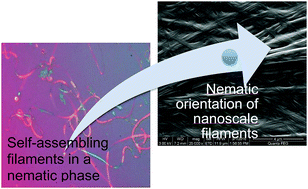Self-assembling, macroscopically oriented, polymer filaments; a doubly nematic organogel
Abstract
Nanoscale phase separation and self-organisation in liquid crystals leads to the formation of remarkable hierarchical structures. There are several examples of heliconical nanofilament structures including in the nematic twist-bend (NTB) phase, the B4 phase and liquid crystal gels formed from the B4 phase. Both the formation of the polymer-like structures that permeate the soft-solids and their hierarchical structures are fascinating, not least because of the analogies that can be drawn with naturally-occurring structures. Here, we report a remarkably simple binary system formed from a non-symmetric BC molecule and the rod-like liquid crystal, 5CB. The pure bent-core system exhibits both nematic and dark conglomerate liquid crystal phases. At very low concentrations of the BC material (5–10%) this binary system spontaneously self-assembles into a soft solid formed from nanoscale filaments that are aligned by their nematic environment. Macroscopically, the soft solid shows behaviour that can be associated with both polymers and gels. Interestingly, the sub-micron scale structure of the filaments appears remarkably similar to some organised fibrous structures in nature (e.g. chitin, cellulose, insect cuticle, plant cell walls) something we attribute to self-assembly and self-organisation in an aligned liquid crystalline environment. The nanoscale structure of the filaments shows no features that can be associated with heliconical ordering down to length scales of tens of nanometers. However, the X-ray data suggest that a metastable rectangular columnar phase which is highly ordered in one dimension initially forms, changing to a hexagonal lattice on a timescale of tens of minutes.



 Please wait while we load your content...
Please wait while we load your content...